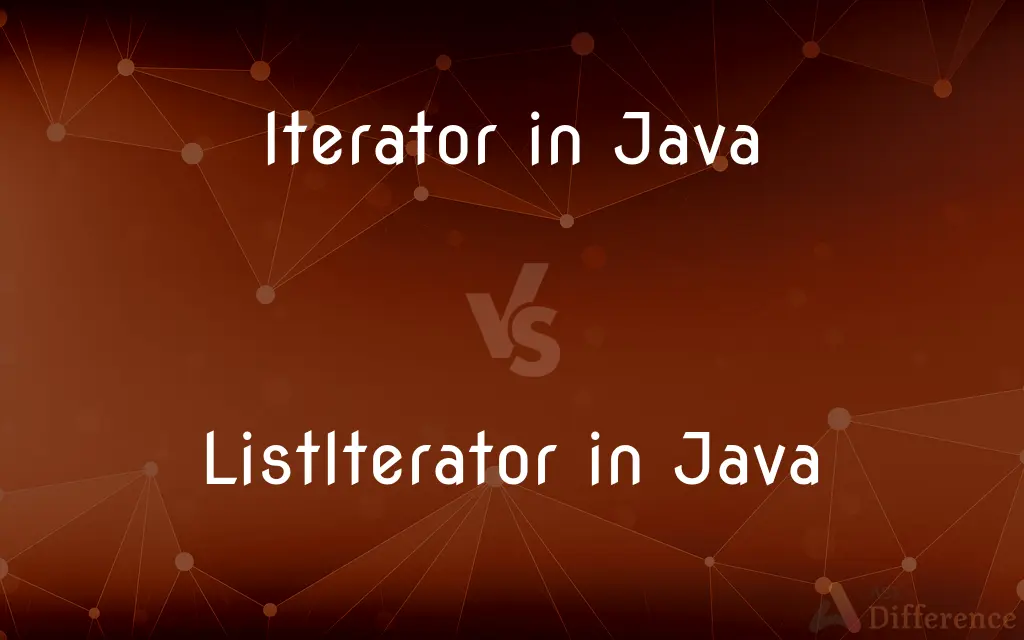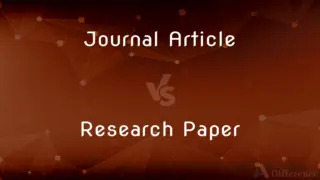Iterator in Java vs. ListIterator in Java — What's the Difference?
By Tayyaba Rehman — Published on January 14, 2024
Iterator in Java navigates unidirectional collections. ListIterator in Java extends Iterator to bidirectionally traverse lists, offering additional operations like previous().

Difference Between Iterator in Java and ListIterator in Java
Table of Contents
ADVERTISEMENT
Key Differences
An Iterator in Java is an interface facilitating the traversal of collections unidirectionally, allowing sequential access to elements using hasNext() and next().
ListIterator, a sub-interface of Iterator, offers bidirectional traversal specifically for Lists. It extends Iterator, enabling navigation in both forward (next()) and backward (previous()) directions.
Java's Iterator supports removing elements using remove() during traversal, interacting with collections like ArrayList, HashSet, or LinkedList.
ListIterator, besides supporting addition and removal operations, allows modification of elements using set() while traversing lists like ArrayList or LinkedList.
Iterators in Java typically traverse collections like ArrayList, HashSet, or TreeMap, offering a systematic way to access and manipulate elements.
ADVERTISEMENT
ListIterator caters explicitly to Lists, enabling traversal operations such as adding, removing, setting elements, and moving both forward and backward within ArrayList or LinkedList.
Iterators, available via the Iterator interface, offer a uniform way to navigate various collections regardless of their types or implementations.
ListIterator specializes in bidirectional traversal, providing additional capabilities to manipulate List elements directly within their order using previous(), next(), and other methods.
The Iterator interface in Java serves as a base for various collection types, supporting operations for iteration, removal, and checking elements' presence.
ListIterator, a specialized form of Iterator, extends its capabilities by facilitating bidirectional traversal and enabling modification of elements in Lists.
Comparison Chart
Traversal Direction
Unidirectional
Bidirectional
Supported Collections
Various collections like ArrayList, HashSet, TreeMap
Specifically designed for Lists like ArrayList, LinkedList
Navigation Operations
HasNext(), next(), remove()
HasNext(), next(), remove(), previous(), hasPrevious(), add(), set()
Element Modification
Allows removal using remove()
Facilitates addition, removal, and modification using add(), set(), remove()
Use Cases
Traversing collections for iteration and removal
Specific navigation within Lists, enabling bidirectional traversal
Compare with Definitions
Iterator in Java
Supports iteration over different collection types uniformly.
An Iterator in Java assists in traversing various collections like HashMap.
ListIterator in Java
Facilitates bidirectional navigation with List-specific manipulations.
A ListIterator in Java offers methods to modify ArrayList elements during traversal.
Iterator in Java
Enables sequential access to elements using hasNext() and next().
Using Java's Iterator, you can navigate through a LinkedList's elements.
ListIterator in Java
Offers additional operations like previous() for backward traversal.
Using ListIterator in Java, you can navigate a LinkedList in both directions.
Iterator in Java
Java's Iterator interface facilitates systematic traversal of collections.
Iterating through a TreeMap in Java is possible using the Iterator interface.
ListIterator in Java
Extends Iterator, enabling bidirectional traversal in Lists.
ListIterator in Java allows moving forward and backward within an ArrayList.
Iterator in Java
An interface for unidirectional traversal of Java collections.
Java's Iterator allows iterating through collections like ArrayList or HashSet.
ListIterator in Java
Specifically designed to navigate elements within List implementations.
ListIterator in Java provides functionalities to modify elements in a List.
Iterator in Java
Provides methods like remove() to delete elements during traversal.
With Iterator in Java, you can remove elements from an ArrayList while iterating.
ListIterator in Java
Java's ListIterator interface extends Iterator for List manipulation.
In Java, ListIterator allows bidirectional traversal and element modification in Lists.
Common Curiosities
Is ListIterator exclusive to Lists?
Yes, ListIterator in Java is specifically tailored for Lists like ArrayList, enabling bidirectional traversal and manipulation.
Can Iterator in Java be used with any collection type?
Yes, Iterator in Java is designed to work with various collection types like ArrayList, HashSet, TreeMap, enabling uniform traversal.
What makes ListIterator different from Iterator in Java?
ListIterator in Java extends Iterator to provide additional bidirectional traversal and modification operations specifically for Lists.
Can elements be modified using Iterator in Java?
Iterator in Java typically supports removal of elements using remove(), but not direct modification.
Is Iterator the preferred choice for List manipulations?
For Lists specifically, ListIterator in Java is more suited as it offers additional bidirectional navigation and modification methods.
Can Iterator traverse collections other than Lists?
Yes, Iterator in Java can navigate various collections like HashMap, HashSet, offering a consistent way to access elements.
Can ListIterator in Java move backward within a List?
Yes, ListIterator in Java offers methods like previous() to navigate Lists in a backward direction.
What additional functionalities does ListIterator provide compared to Iterator?
ListIterator in Java extends Iterator by adding methods like previous(), add(), and set() for List manipulations during traversal.
Can ListIterator be used with non-List collections?
No, ListIterator in Java is designed explicitly for Lists like ArrayList and LinkedList and cannot be used with other collection types.
How does ListIterator handle both forward and backward navigation?
ListIterator in Java provides methods like next() and previous() for seamless movement in both forward and backward directions within Lists.
Is Iterator implemented by all Java collection types?
Yes, Iterator is a fundamental interface implemented by most Java collection types, offering consistent traversal methods.
Can ListIterator in Java modify elements without deleting them?
Yes, ListIterator provides methods like set() to modify elements without removing them while traversing Lists.
Is the removal of elements mandatory during traversal using Iterator?
No, removal using remove() with Iterator in Java is optional based on the traversal requirements.
Does Iterator support addition of elements to a collection?
Standard Iterator in Java does not offer direct addition methods like add(), primarily focused on iteration and removal.
Are there any constraints on using Iterator with specific collection types?
Iterator in Java generally works across different collection types, but some specialized collections might have specific Iterator implementations.
Share Your Discovery

Previous Comparison
Atomic Weight vs. Atomic Mass
Next Comparison
Journal Article vs. Research PaperAuthor Spotlight
Written by
Tayyaba RehmanTayyaba Rehman is a distinguished writer, currently serving as a primary contributor to askdifference.com. As a researcher in semantics and etymology, Tayyaba's passion for the complexity of languages and their distinctions has found a perfect home on the platform. Tayyaba delves into the intricacies of language, distinguishing between commonly confused words and phrases, thereby providing clarity for readers worldwide.
















































